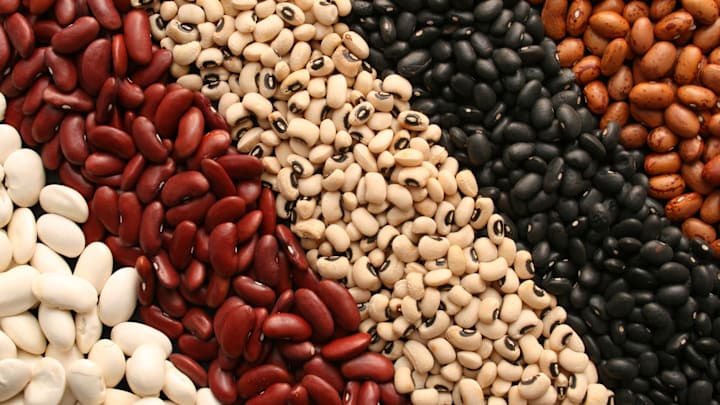Stocking up on chow for a potential emergency? Canned tuna and dried fruit will last for quite a while in your pantry, but if you want foods that will really last for the long haul, reach for one of these endurance champs.
1. White Rice

Researchers have found that white (or polished) rice will maintain its nutrient content and flavor for 30 years when stored in oxygen-free containers in temperatures below 40° F. Brown rice, however, doesn’t last nearly as long (six months) because of the natural oils found in its bran layer.
2. Honey

Honey has been called the only food that truly lasts forever, thanks to its magical chemistry and the handiwork of bees. The nectar from flowers mixes with enzymes inside the bees that extract it, which changes the nectar’s composition and breaks it down into simple sugars that are deposited into honeycombs. Fanning action from the bees’ wings and the enzymes from their stomachs create a liquid that is both highly acidic and low in moisture—truly inhospitable digs for bacterial growth.
The processing and sealing of honey also adds to its indefinite shelf life. Despite being low in moisture, honey’s sugars are hygroscopic, which means that they take in moisture from the air. When the heated and strained honey is sealed properly, moisture cannot be absorbed, and the honey stays the same forever. The oldest jar of the sweet stuff ever found is believed to be 5500 years old.
3. Salt

Given that sodium chloride is a mineral that is taken from the earth, its permanence should come as no surprise. It has also been used for centuries as a tool for preserving other foods (or bodies) because it removes moisture. The salt in your cupboard may not last forever, though. Morton Salt points out that adding iodine to table salt reduces the shelf life, so if your container says iodized salt, expect it to only last about 5 years.
More Articles About Expiration Dates:
4. Soy Sauce

The consensus seems to be that it depends on the type and which additives a particular brand uses, but when left unopened, soy sauce will last a very long time. Even after it has been opened, the salty condiment can keep for years in your refrigerator.
5. Sugar

As with other items on this list, the storage method you use for your sugar determines whether you can keep it forever. Powdered and granulated sugar are best kept in airtight containers to keep the moisture at bay. Retailers are required to stamp bags with dates, but manufacturers say that even hardened brown sugar is still edible once it has been softened.
6. Dried Beans

As with the rice studies, researchers at Brigham Young University found that after 30 years, the overall quality of pinto beans decreased, but “all samples were considered acceptable for use in an emergency situation by at least 80 percent of consumer panelists. Also, protein digestibility was found to remain stable over time.”
7. Pure Maple Syrup

A Guide to Food Storage for Emergencies by Utah State University [PDF] lists pure maple syrup along with other commercial sugars (like honey and granular sugars) as having an indefinite shelf life “due to their resistance to microbial growth, including molds.” The Massachusetts Maple Producers Association agrees that unopened maple syrup will last forever, but they also provide consumers with instructions should molding occur: “If any harmless mold should form on the surface, merely bring the syrup to a slight boil, skim the surface, and pour into a clean container and refrigerate.”
8. Powdered Milk
The taste isn’t quite as good, but one of the main reasons that powdered milk exists is because it lasts longer. It is also easier to transport and store than fresh milk.
9. Hard Liquor

Toss out the cream liqueurs, but you can always keep a stash of the hard stuff. While the flavors will almost certainly change because of oxidation, and an opened bottle may be short a few ounces because of evaporation, your spirits will be okay to drink as long as there is someone there to drink them.
10. Pemmican
Invented by Native American peoples, pemmican is still a favorite of survivalists looking for a long-lasting, portable source of protein. Original recipes included dried meat from big game animals like elk or buffalo, which was ground into a powder and mixed with available berries and rendered fat. The finished pemmican could then be eaten raw, stewed, or fried. Today, recipes for pemmican are often slightly modified, given food safety and dietary concerns and available ingredients, but some still swear by the superfood’s staying power.
A version of this story originally ran in 2016; it has been updated for 2023.
